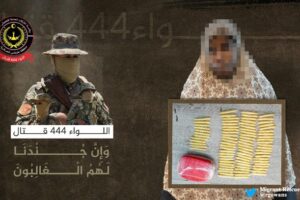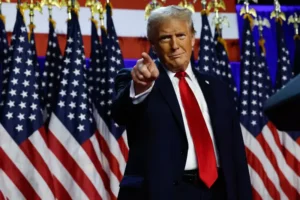Tensions remained high in India’s capital Thursday, as thousands of riot police and paramilitaries patrolled streets littered with the debris from days of sectarian riots that have killed 38 people.
An uneasy calm has descended over the affected northeast fringes of the Indian capital, punctuated by sporadic outbreaks of violence overnight.
The unrest was the latest bout of violence over Prime Minister Narendra Modi’s citizenship law, which triggered months of demonstrations that turned deadly in December.
Sunil Kumar, director of the Guru Teg Bahadur (GTB) Hospital, said Thursday it had registered 34 deaths, adding that “all of them had gunshot injuries”.
The chief doctor at Lok Nayak Hospital said three people had died there. Another victim died at Jag Parvesh Chander Hospital, an official said.
Kishore Singh, medical superintendent at Lok Nayak Hospital, told AFP 10 people were still in a serious condition.
Delhi’s chief minister Arvind Kejriwal on Thursday said families of those who died, were injured or had their businesses and homes destroyed during the rampage would be compensated.
Food and other support would also be provided to trashed neighbourhoods, he added.
Police said they had detained or arrested more than 500 suspects for questioning, and had also starting holding “peace committee meetings” across the megacity to “improve inter-community harmony”.
The new fatalities — up from 27 on Wednesday — were all from the violence on Monday and Tuesday when mobs of Hindus and Muslims fought running battles, except for one from Wednesday.
The initial violence erupted late Sunday.
Groups armed with swords and guns set fire to thousands of properties and vehicles.
Homes, shops, two mosques, two schools, a tyre market and a fuel station were torched.
More than 200 people were also injured.
According to a list from the GTB hospital seen by AFP, the victims are a roughly even mix of Hindus and Muslims, based on their names.
Delhi police spokesman Mandeep Randhawa told AFP that there was “no major incident” overnight, while the city’s chief fire officer Atul Garg said they received 19 distress calls.
‘Gun down traitors’
In December at least 30 people were killed, mostly in police action in the northern state of Uttar Pradesh, home to a significant Muslim population, after the citizenship law was passed.
Many of India’s 200 million Muslims fear the citizenship law — combined with a mooted citizens’ register — will leave them stateless or even sent to detention camps.
They and critics see Modi’s right-wing ruling party, which is linked to once-banned militaristic Hindu group RSS, as wanting to turn officially secular India into a Hindu nation.
His party has denied the allegations but in recent weeks BJP politicians, including in an ugly recent campaign for Delhi elections, have called the demonstrators “anti-nationals” and “jihadists”.
One, Parvesh Verma, said protestors “could enter houses and rape and kill your sisters”, while another, Anurag Thakur, encouraged a crowd to chant “gun down traitors”.
A call on Sunday by another BJP politician, Kapil Mishra, for “Hindus” to clear a northeastern Delhi sit-in protest is being seen as the spark for the current unrest.
On Wednesday a Delhi High Court judge, Justice S. Muralidhar, sharply criticised the police and called on them to investigate BJP politicians for inciting violence.
Muralidhar was transferred to another state court in a late-night order, prompting a social media storm. Law Minister Ravi Shankar Prasad insisted it was a “routine transfer”.
UN rights chief Michelle Bachelet called on India’s political leaders to “prevent violence”, while the Organisation of the Islamic Conference said it “condemns the recent and alarming violence against Muslims in India”.
On Wednesday the US Commission on International Religious Freedom, which advises Washington but does not set policy, voiced “grave concern” about the violence as President Donald Trump was visiting.
Trump, asked at a news conference in the capital about the violence, said the issue was “up to India” and praised Modi’s “incredible” statements on religious freedom.
AFP










Add Comment